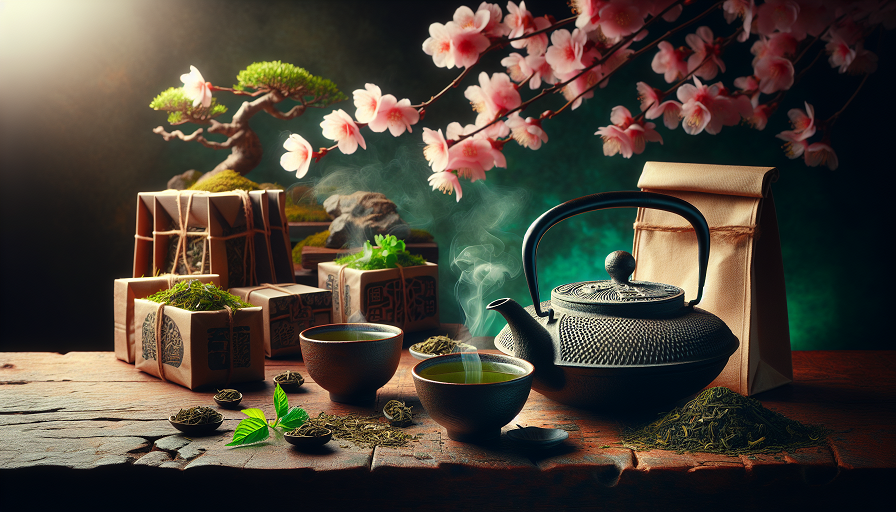
Memory, like a well-trained muscle, needs the right fuel to stay strong. Japanese green tea offers a natural boost for those looking to enhance cognitive wellness, support memory, and keep mental fog at bay. Rich in antioxidants, amino acids, and calming compounds, Japanese green tea stands out as a simple yet powerful addition to a brain-healthy lifestyle. Let’s explore the science behind Japanese green tea and its unique contributions to memory and cognitive health.
Contents
The Key Nutrients in Japanese Green Tea That Benefit Memory
What makes Japanese green tea so beneficial for cognitive health? It’s all about the special compounds packed within each leaf. This tea contains a unique combination of caffeine, L-theanine, and potent antioxidants called catechins, especially EGCG, which work together to support memory and brain health.
Catechins: Powerful Antioxidants That Protect Brain Cells
Catechins, particularly epigallocatechin gallate (EGCG), are some of the most powerful antioxidants found in Japanese green tea. These compounds protect brain cells from oxidative stress – the kind of damage caused by free radicals. Over time, oxidative stress can harm brain cells, slowing down mental processing and memory recall. By neutralizing these free radicals, catechins help maintain cognitive wellness and give the brain a better chance at staying sharp.
Caffeine and L-theanine: The Perfect Pair for Focus and Recall
Japanese green tea contains a balanced dose of caffeine, providing just enough stimulation to improve focus without overwhelming the senses. But what really makes green tea unique is its high content of L-theanine, an amino acid that promotes relaxation without sedation. When combined with caffeine, L-theanine produces a calm, focused state that’s ideal for memory retention and concentration.
This duo creates what could be called a “productive calm.” You’re alert but relaxed, which is a sweet spot for learning and memory. Unlike coffee, which can sometimes make us feel wired, Japanese green tea offers a balanced mental state, making it easier to concentrate, absorb information, and retain memories.
How Japanese Green Tea Improves Memory Recall
Memory recall is a complex process involving various parts of the brain. Japanese green tea aids this process by promoting healthy blood flow, supporting neurotransmitter activity, and reducing brain inflammation – all factors that contribute to clearer, stronger memory.
Boosting Blood Flow for Better Brain Function
Good blood flow is essential for delivering oxygen and nutrients to brain cells, which in turn supports healthy brain function. Japanese green tea has been shown to improve blood circulation, helping the brain get the nutrients it needs to perform optimally. Improved blood flow means better access to resources that support memory, focus, and quick recall.
Supporting Neurotransmitters Essential for Memory
L-theanine, along with caffeine, helps boost the production of dopamine and serotonin – neurotransmitters that play critical roles in mood, memory, and learning. By supporting these neurotransmitters, Japanese green tea enhances the brain’s ability to store and retrieve information. It’s like having a well-organized filing system in your mind, making it easier to access memories when you need them.
The Role of Japanese Green Tea in Long-Term Cognitive Health
Drinking Japanese green tea isn’t just about short-term focus and memory. Over time, the antioxidants and other nutrients in green tea offer protection against cognitive decline, making it a smart choice for lifelong brain health.
Reducing Inflammation and Supporting Neuron Health
Chronic inflammation in the brain is linked to cognitive decline and neurodegenerative diseases like Alzheimer’s. EGCG and other catechins in Japanese green tea have anti-inflammatory properties, which help protect neurons from the kind of damage that can impair memory over time. By keeping inflammation in check, green tea creates a healthier environment for brain cells to thrive.
Preventing Age-Related Memory Decline
Research suggests that people who regularly drink green tea are less likely to experience severe memory decline as they age. The combination of antioxidants and neurotransmitter support in Japanese green tea helps protect against age-related cognitive issues, keeping memory and focus sharp well into older age. It’s like adding an extra layer of protection for the brain, keeping it resilient against the effects of time.
- Anti-inflammatory effects: EGCG helps reduce brain inflammation, lowering the risk of cognitive decline.
- Neuroprotective properties: Catechins protect neurons, preserving memory and learning abilities over time.
Japanese Green Tea as a Natural Stress Reliever
Stress is one of the biggest obstacles to memory and cognitive wellness. When we’re stressed, it’s harder to focus, retain information, and recall details accurately. Japanese green tea helps manage stress through its high L-theanine content, which promotes a calm, relaxed state – the perfect foundation for mental clarity.
Calming the Mind for Better Memory
L-theanine naturally reduces levels of cortisol, the body’s primary stress hormone. By helping to lower cortisol levels, Japanese green tea creates a mental environment that’s less clouded by stress, making it easier to concentrate and remember details. It’s like a mental reset, giving you a clear mind to work with.
Improving Sleep Quality for Memory Health
Good sleep is essential for memory consolidation – the process by which short-term memories are strengthened into long-term ones. L-theanine not only promotes calmness but also improves sleep quality, which is crucial for memory retention. A restful night’s sleep after a cup of green tea can leave the brain refreshed and ready for new information.
How to Incorporate Japanese Green Tea into Your Routine for Memory Support
Ready to give your memory a natural boost? Adding Japanese green tea to your daily routine is simple and enjoyable. Here are a few tips to maximize the brain benefits of this ancient beverage.
Choose the Right Tea for Maximum Benefits
To get the most brain-boosting benefits, opt for high-quality Japanese green teas like matcha, sencha, or gyokuro. Matcha, in particular, is packed with nutrients since the whole tea leaf is consumed, giving you a higher concentration of EGCG and L-theanine. A well-sourced, high-quality tea provides the richest nutrient profile, so invest in the best you can find.
Enjoy It Mid-Morning or Early Afternoon
Japanese green tea is best enjoyed during the morning or early afternoon, when it can provide a gentle lift in energy and focus. Try making it part of your routine, whether as a mid-morning boost or an afternoon pick-me-up. These times also tend to be optimal for taking in new information and reinforcing memory, making green tea a helpful companion.
Experiment with Different Varieties for Taste and Effect
There are many types of Japanese green tea to explore, each with slightly different flavors and benefits. Experimenting with varieties like genmaicha (green tea with toasted rice) or hojicha (roasted green tea) allows you to find the flavor profile and caffeine level that best suits your needs. Each tea brings its own unique balance of brain-boosting compounds, so you can enjoy the journey of discovery while supporting cognitive health.
Incorporating Japanese green tea into your day isn’t just a treat for the taste buds; it’s a gift to your brain. With each sip, you’re supporting memory, focus, and long-term cognitive wellness naturally – no need for flashy supplements or complex routines. Just a simple, time-honored drink with incredible benefits for the mind.

